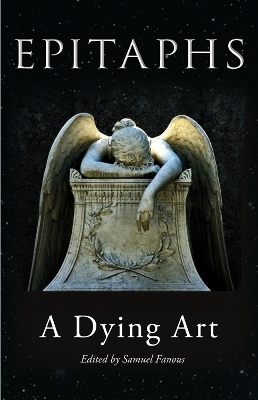
Epitaphs
A Dying Art
Seiten
2016
Bodleian Library (Verlag)
978-1-85124-451-5 (ISBN)
Bodleian Library (Verlag)
978-1-85124-451-5 (ISBN)
Epitaphs are a unique artform. This book brings together over 250 epitaphs from cemeteries, churchyards, funerary monuments and historical records - spanning the centuries with the best and most intriguing examples of the final word.
Epitaphs are a unique artform. In previous centuries they were regarded as an opportunity to celebrate, mourn, reflect on, philosophize, lament, or affirm the individual and the mystery of life and death, often giving rise to carefully crafted verse. In more recent times, humour has come into play: Spike Milligan’s characteristically irreverent epitaph – which translates as ‘I told you I was ill’ – gives new life to his comedic voice beyond the grave.
This book brings together over 250 epitaphs from cemeteries, churchyards, funerary monuments and historical records. The gravestones of famous people often give rise to memorable and evocative lines, such as ‘curst be he that moves my bones’ (Shakespeare’s grave), ‘Horseman, pass by!’(W.B. Yeats) or ‘Called back’ (Emily Dickinson).
Others tell us something about the cause of death, frequently invoking a macabre sense of humour: ‘Here lies John Ross / Kicked by a Hoss’. More often there is a wry tone which characterizes the most well-known epitaphs, combining rhyme and humour:
Remember friend as you pass by
As you are now so once was I.
As I am now you will surely be
Prepare thyself to follow me.
This book spans the centuries with the best and most intriguing examples of the final word.
Epitaphs are a unique artform. In previous centuries they were regarded as an opportunity to celebrate, mourn, reflect on, philosophize, lament, or affirm the individual and the mystery of life and death, often giving rise to carefully crafted verse. In more recent times, humour has come into play: Spike Milligan’s characteristically irreverent epitaph – which translates as ‘I told you I was ill’ – gives new life to his comedic voice beyond the grave.
This book brings together over 250 epitaphs from cemeteries, churchyards, funerary monuments and historical records. The gravestones of famous people often give rise to memorable and evocative lines, such as ‘curst be he that moves my bones’ (Shakespeare’s grave), ‘Horseman, pass by!’(W.B. Yeats) or ‘Called back’ (Emily Dickinson).
Others tell us something about the cause of death, frequently invoking a macabre sense of humour: ‘Here lies John Ross / Kicked by a Hoss’. More often there is a wry tone which characterizes the most well-known epitaphs, combining rhyme and humour:
Remember friend as you pass by
As you are now so once was I.
As I am now you will surely be
Prepare thyself to follow me.
This book spans the centuries with the best and most intriguing examples of the final word.
Samuel Fanous is a member of the English Faculty, University of Oxford.
| Erscheinungsdatum | 05.05.2016 |
|---|---|
| Sprache | englisch |
| Maße | 120 x 185 mm |
| Gewicht | 220 g |
| Themenwelt | Literatur ► Anthologien |
| Literatur ► Comic / Humor / Manga ► Humor / Satire | |
| Sonstiges ► Geschenkbücher | |
| Sozialwissenschaften ► Ethnologie ► Volkskunde | |
| ISBN-10 | 1-85124-451-4 / 1851244514 |
| ISBN-13 | 978-1-85124-451-5 / 9781851244515 |
| Zustand | Neuware |
| Haben Sie eine Frage zum Produkt? |
Mehr entdecken
aus dem Bereich
aus dem Bereich
Die zehn großen Vorzüge unserer erstaunlichen Sprache
Buch | Softcover (2022)
Piper (Verlag)
12,00 €
Die Online-Omi packt den Ranzen
Buch | Softcover (2023)
Ullstein Taschenbuch Verlag
11,99 €
Buch | Hardcover (2023)
dtv Verlagsgesellschaft
22,00 €


